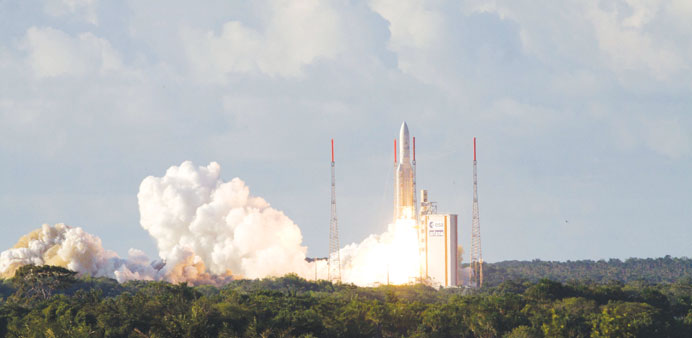|
|
Officials of global space technology and satellites companies have hailed Qatar’s launch of its first satellite Es’hail 1 and the country’s desire to benefit from space technology.
The satellite was successfully launched into orbit by an Ariane-5 rocket from the European Space Centre in Kourou, French Guiana, on the northeast coast of South America.
CEO of Es’hailSat, Ali bin Ahmed al-Kuwari, who was present during the launch, said the satellite programme is important for Qatar as the country seeks to meet the rapidly growing communications needs in the region.
“With the arrival of Es’hail 1, we have completed the first step in our mission to become a centre of excellence in the region and develop a sustainable national satellite industry,” he said.
“Qatar’s first satellite will provide our strategic stakeholders and commercial customers with broadcasting independence, quality service and wide geographical coverage. We congratulate Arianespace on delivering a picture-perfect lift-off and look forward to working with Eutelsat’s operations team to bring Es’hail 1 into service,” he added.
The launch event was celebrated by the Qatari delegation. The event was attended by Nicolas Brix, the French minister of foreign trade.
The Qatari delegation earlier visited the space centre in Kourou, where the necessary procedures and arrangements were being taken prior to the launch of the satellite.
The launching ceremony was also attended by Qatar’s Minister of Information and Communication Technology HE Dr Hessa Sultan al-Jaber, the CEO of Qatar Foundation for Media Mubarak bin Jaham al-Kuwari, director of Qatar TV Sheikh Abdulaziz bin Thani bin Thani al-Thani and Qatar’s Ambassador to France Mohamed Jaham al-Kuwari.
Qatar’s delegation included representatives of armed forces, the Ministry of Interior and the Ministry of Communication and Information Technology, Es’hailSat, Qatar News Agency (QNA), Qatar TV, Al Jazeera channel and Al Rayyan TV along with a number of Qatari students and guests.
Es’hail 1 aims to respond to the needs of local customers in Qatar and throughout the Middle East and North Africa and Central Asia and is to broadcast high definition television (HDTV) and standard definition television (SDTV) channels.
It will provide advanced satellite services and television, voice, Internet, corporate and government services across the region and beyond.
The name of the satellite is derived from the name of a star which becomes visible in the night sky in the Middle East when summer turns to autumn.
“Traditionally, the sighting of Es’hail marks the beginning of the most enjoyable weather conditions in the region and we are eagerly awaiting the launch of Es’hail 1 - our new star over Qatar,” al-Kuwari said earlier.
Broadcasting from the premium hot spot neighbourhood of 25.5 degrees East and addressing the growing demand for HDTV, Es’hailSat will provide the much-needed additional capacity for TV channels. It will also provide high-tech services for clients in the Middle East and North Africa, and be able to cater to the broadcasting demands of the FIFA World Cup in 2022 which is to be hosted by Qatar.
Weighing almost six tonnes, Es’hail 1 has four steerable spot beam antennas and four deployable reflectors along with advanced command and telemetry capabilities.
It is based on the highly reliable SSL 1300 platform and provides the flexibility to support a broad range of applications and technology advances.
In addition to securing Ku-band continuity and additional Ku-band resources Es’hail 1 will initiate a Ka-band and carries relay payloads in UHF, S-band, C-band and Ku-band.
Qatar has signed with a partnership agreement to build, launch and operate the satellite with French-based global provider Eutelsat.
On July, 9 Es’hail marked a major milestone in the satellite programme with the official opening of the company’s capacity management centre (CMC) in Doha.
Es’hailSat’s CMC will manage access to the company’s satellite fleet, starting with Es’hail 1. The centre is to be manned 24/7 to guarantee and co-ordinate the delivery of high-quality, optimised services to customers with a strong emphasis on interference mitigation and protection of customer signals.

